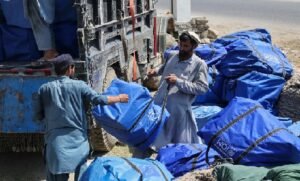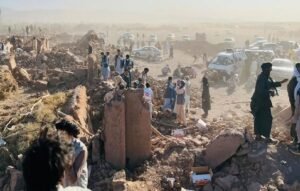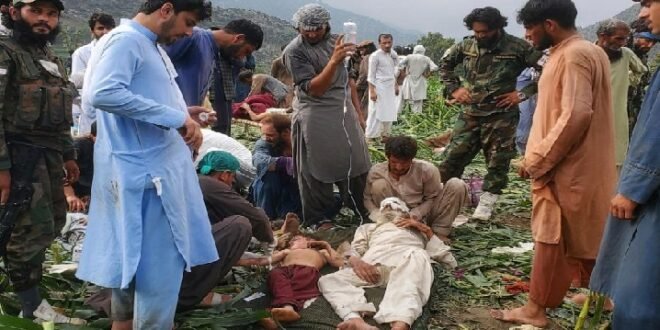14-09-2025
GENEVA: Urgent funding is needed to scale up life-saving support for families forced to sleep outdoors following powerful earthquakes that recently struck eastern Afghanistan, the UN’s migration agency said on Thursday.
The International Organization for Migration (IOM) is appealing for $16.8 million, in line with the United Nations joint humanitarian appeal, to provide emergency shelter and health care for 134,000 people.
 “Families have lost everything and are now sleeping in the open, without proper shelter, food or clean water,” said IOM Deputy Director General Ugochi Daniels.
“Families have lost everything and are now sleeping in the open, without proper shelter, food or clean water,” said IOM Deputy Director General Ugochi Daniels.
The 6.0 magnitude earthquake struck on the night of August 31 into September 1, killing more than 2,200 people, destroying more than 7,000 homes and affecting nearly half a million people, according to IOM.
The agency warned that the situation could worsen without urgent support as winter approaches, with women and children facing particular protection risks due to unsafe conditions, lack of privacy and limited access to basic services.
More than 2,000 families have already received assistance from IOM in Nangarhar and Kunar, after relief teams navigated blocked roads and damaged infrastructure.
IOM has raised the alarm that urgent funding is needed as the country faces multiple crises including the return of more than 1.7 million Afghans from Iran and Pakistan in 2025.
According to IOM data, nearly 800,000 internally displaced persons and returning Afghan migrants already live in extremely vulnerable conditions in the affected provinces.
The UN considers Afghanistan’s humanitarian crisis to be among the worst in the world, but funding is down 35% since last year due to cuts from major donors, including the United States.
Earlier, the United Nations said on Tuesday it was seeking $139.6 million to help half a million people affected by earthquakes that struck eastern Afghanistan and it urged donors to set aside any reservations about the Taliban authorities.
 Afghanistan’s worst earthquake in years, which struck on the night of August 31 into September 1, killed more than 2,200 people and was followed by a series of powerful aftershocks. The quakes have left tens of thousands of people homeless, with some fearing further landslides.
Afghanistan’s worst earthquake in years, which struck on the night of August 31 into September 1, killed more than 2,200 people and was followed by a series of powerful aftershocks. The quakes have left tens of thousands of people homeless, with some fearing further landslides.
Colder temperatures set to arrive within weeks will mean tougher conditions for survivors in remote mountain areas, said Indrika Ratwatte, the UN Humanitarian Coordinator for Afghanistan.
“This is a moment where the international community must dig deep and show solidarity with a population that has already endured so much suffering,” he told a Geneva press briefing.
“Right now lives are at stake. Two or three more weeks and the winter temperatures will be reaching these high-altitude communities,” he added.
The UN considers Afghanistan’s humanitarian crisis to be among the worst in the world but funding is down 35% since last year due to cuts from major donors, including the United States. The cuts have grounded a helicopter which would have otherwise facilitated access to remote villages, Ratwatte said.
Asked about the reasons for the loss of funding, Ratwatte blamed multiple competing crises but also alluded to many donors’ reluctance to provide aid to the Taliban government in Afghanistan on account of its policies towards women.
“Some governments do have reservations because of the policies of the de facto authorities,” he said, referring to the Taliban. “Our appeal has always been to focus on the people.” (Int’l Monitoring Desk)
 Pressmediaofindia
Pressmediaofindia




